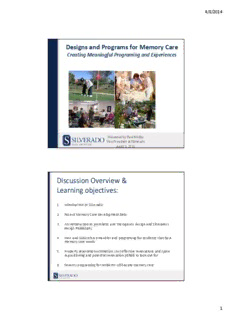Table Of Content4/8/2014
Designs and Programs for Memory Care
Creating Meaningful Programing and Experiences
Presented by Paul Mullin
Vice President at Silverado
April 1, 2014
Discussion Overview &
Learning objectives:
1. Introduction to Silverado
2. Recent Memory Care Development Data
3. An introduction to prosthetic and therapeutic design and Silverado’s
design Philosophy
4. New and innovative amenities and programing for residents that have
memory care needs
5. Property renovation estimation, cost effective renovations and space
repositioning and potential renovation pitfalls to look out for
6. Sensory programing for residents with acute memory care
1
4/8/2014
SILVERADO – VISION
• Give LIFE to
residents, clients
and patients
• Their families
• Our associates
• Leave the world a
better place
SILVERADO – PURPOSE DRIVEN
(cid:131) Silverado’s purpose is to change the world
(cid:131) How people with chronic disease and at end‐of‐life are
cared for
(cid:131) How associates are treated
(cid:131) Serve a higher purpose
(cid:131) Get/Give
(cid:131) LOVE>fear
2
4/8/2014
INCEPTION OF SILVERADO MODEL
(cid:131) What would we want for our parents? What about cost?
(cid:131) What is required to dramatically improve the quality of
life—resident, family and the staff?
(cid:131) Staffing
(cid:131) Living environment—pets, plants, outdoors
(cid:131) Intergenerational programming
(cid:131) Freedom to live
(cid:131) Sense of control
(cid:131) World class
2014 LOCATIONS
(cid:131) 30 Memory Care Communities, plus 3 in development:
2 AZ, 11 CA, 1 CO, 4 IL, 10 TX, 1 UT, 2 WA and 2 WI
(cid:131) 8Licensed Hospice Offices, plus 2 in development:
5 CA, 4 TX and 1 UT
(cid:131) 6 Silverado At Home Offices:
4 CA and 2 TX
That’s 44 total separate service locations across 8 states, plus 5
in development, and 3,500 associates.
3
4/8/2014
SILVERADO’S LOCATIONS
ROSE’S WINNING PITCH
4
4/8/2014
Memory Care Inventory (in Units) by Campus Type; MAP31
4Q05 –4Q12
50,000
45,000
40,000
35,000
30,000
CCRC
25,000
Combined
20,000 Freestanding
15,000
10,000
5,000
0
2006 2007 2008 2009 2010 2011 2012
Source: NIC MAP®Data & Analysis Service
Memory Care Inventory Growth; MAP31
4Q05 –4Q12
1,200 12%
Unit Growth
1,000 Annualized Growth 10%
800 8%
600 6%
400 4%
200 2%
0 0%
CHIMINDALPHOLAHOUNYBOSTAMATLPHIKCSACDENSDSTLSFSEABALCINDCPORPITDETORLRIVSASJCLELVMIA
Source: NIC MAP®Data & Analysis Service
5
4/8/2014
Memory Care Environment
• Fortifies autonomy and well
being
• Residential environment ‐
familiar and homelike
• Promotes safety and reduces
fear
• Limit range of options to
create an environment that
the resident can manage
• Constantly stimulate the
patient’s senses at the
appropriate levels
• Promotes feelings of security,
mastery and belonging to
lessen resident’s frustrations
Design Process – Applied Research
• New construction vs. renovation
• Critical analysis of the environment
and identify opportunities
• Apply research to process ‐Direct
cognition so that the environmental
modification contributes to each
resident’s personal success
• Apply research to process ‐Donald
Norman “natural mapping” –“the
environment should contain
knowledge necessary for its correct
use, rather than relying on the
knowledge held in the head of the
user”
• Provide walking paths and access to
outdoor areas
• Maintain the quality of life through
design
6
4/8/2014
Silverado Design Philosophy
All Silverado communities provide a secure environment
specializing in caring for those with all types of memory
impairment. The environment we create is planned
thoughtfully to benefit memory‐impaired residents by
incorporating two fundamental design strategies.
(cid:153)Our “Prosthetic” environmental design compensates
for deteriorating or missing cognitive skills.
(cid:153)Our Therapeutic environmental design attributes
exercise, maintain and strengthen remaining skills.
Therapeutic Environment
• Exercise and strengthen remaining
skills
• Support functional ability through
meaningful design imagery
• Activities can change negative
emotions and quickly promote
feelings of purpose and
achievement
• Maximize awareness, orientation,
autonomy and perceived control
• Provide opportunities for positive
stimulation & change
• Create opportunities for
socialization and spontaneity
• Ensures privacy and dignity
7
4/8/2014
Design Example
Silverado Senior Living, Beach Cities| Redondo Beach, CA | Memory Care
Conversion
Creative
Outdoor
Space
Wonderful outdoor areas,
featuring a courtyard with a
gazebo, putting green,
fountain, raised planters
and secure walking paths,
encourage residents to
spend time outside and
maintain mobility, strength
and balance. This also
fosters a sense of
independence that is
helpful in maintaining
functional levels.
8
4/8/2014
Memory Boxes are a Prosthetic
Wayfinding Device
• Contain significant memorabilia of a
persons life, such as photographs or
nostalgic artifacts
• Items remain recognizable late into the
stages of Alzheimer's disease because
they are overlearned
• Therapeutic component to the resident &
will function in long term memory cuing
• Personalization & reinforcement of the
person
• Visual and intellectual interest, a rich
source of information and positive
stimulation
• Important to create familiarity within the
home environment and reinforce
perceived control over the environment
CHICAGO, ILLINOIS: NAPERVILLE
9
4/8/2014
Orientation and Wayfinding
• Design for a logical circulation
system that removes obstacles
or anything competing with
awareness and perception of
the environment
• Provide a circular or looping
circulation system
• Visible and obvious access
• Security and controlled access
to undesirable spaces or exits
• Eliminate long, lengthy
corridors and “dead ends”
• Break up long corridors with
rest areas
• Simplify wayfinding system to:
paths, edges, districts, nodes
and landmarks
Silverado New Community Prototype
10
Description:Property renovation estimation, cost effective renovations and space Memory Care Inventory (in Units) by Campus Type; MAP31. 4Q05 – 4Q12.

